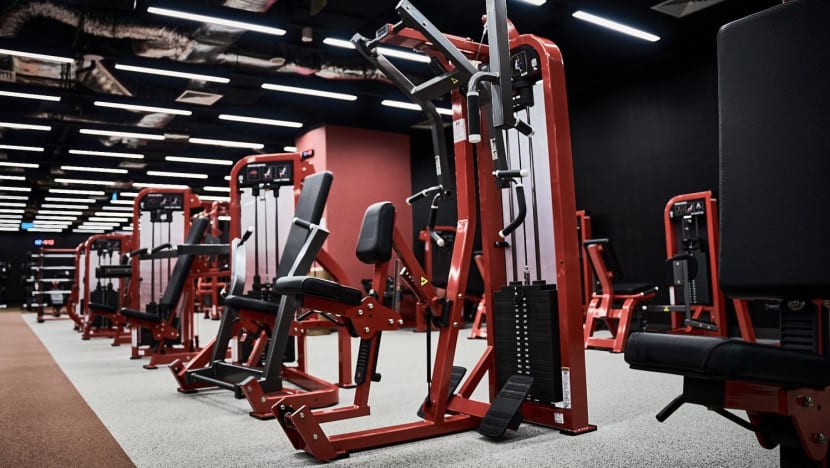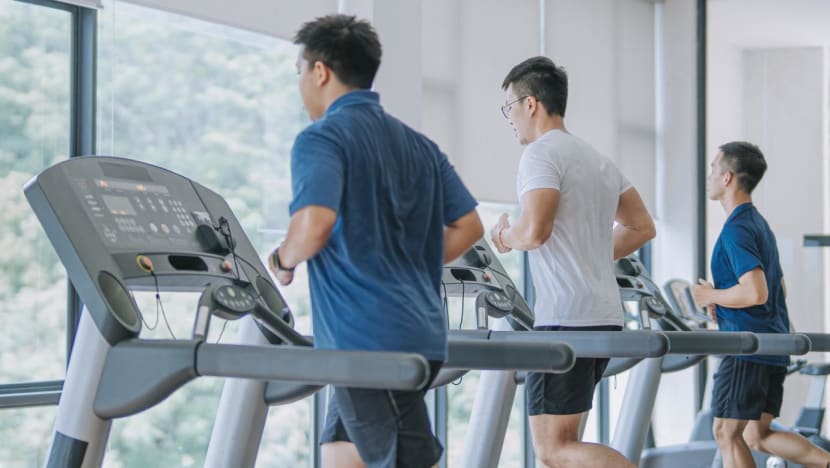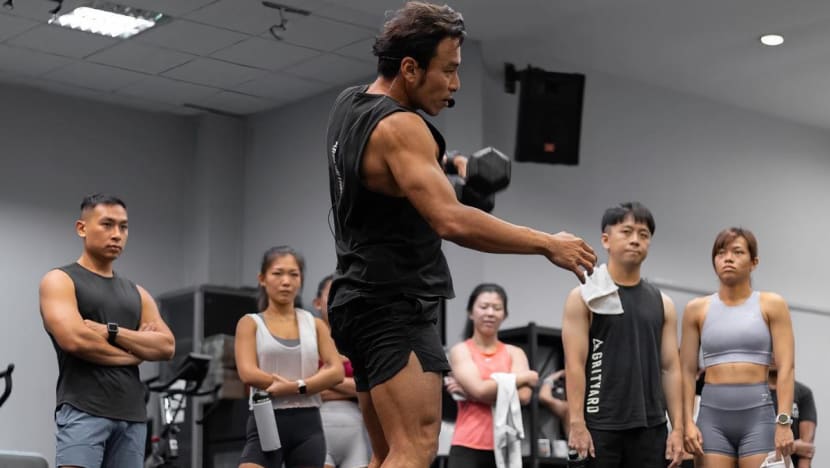Unhealthy routines, revenge travel: Why gyms have yet to bounce back from pandemic lows
Struggles faced by the fitness industry have been evident in recent weeks with the sudden closure of gyms like X Fitness and Superfly Studios.

Gym equipment in Urban Den. (Photo: Urban Den)
SINGAPORE: It has been more than a year since fitness enthusiasts were able to resume high-intensity indoor exercises with their masks off, but gyms in Singapore say that business has yet to bounce back to pre-COVID levels.
Rising costs, manpower shortages, new daily routines that eschew gym-going and renewed distractions in the form of travel are just some of the challenges facing fitness businesses that spoke to CNA.
The fitness industry has rallied this year to rebuild what it lost during the pandemic, said Mr Ross Campbell, co-founder of the SG Fitness Alliance, a non-profit industry association.
“Sadly several businesses had to close but we’ve gratefully seen several new investors and operators come into the market with exciting new facilities and member experiences.
“However, persistent headwinds still exist that are hindering most businesses’ full recovery to pre-pandemic levels,” Mr Campbell said.
SUDDEN CLOSURES
The struggles faced by the fitness industry have been evident in recent weeks with the sudden closure of gyms like X Fitness and Superfly Studios.
X Fitness, a spin studio at GR.iD mall in Selegie, went dark on the Internet in the middle of September, leaving customers unable to book classes and stranded with unclaimed class packages.
One customer told CNA that the gym did not inform her about the closure, and that her attempts to contact the studio were unsuccessful.
The police have said that reports were lodged over the closures of X Fitness and affiliated brand Kyklos Studio, and that they are looking into the matter.
Police also confirmed that a report was lodged over the closure of Superfly.
The company launched in September last year and offered various exercise classes at three outlets.
A check of its Facebook page and Google reviews showed several comments by customers expressing unhappiness at a lack of communication and refunds after outlets closed.
A Superfly representative told CNA that the company gave customers a “gradual communication” about the closure from the last week of August, with a “final communication” before the month’s end.
The company added that staff were consulted beforehand and “a consensus was formed to wind down the business”.
Operations at its United Square studio were transferred to 24-hour fitness chain Anytime Fitness, while its studio at Forum The Shopping Mall is in the process of being taken over by another operator, the representative said.
Superfly said it had processed 75 per cent of customers’ class package refunds as of Sep 14, and expected to complete the remaining 25 per cent “in the next few weeks”.
The Superfly representative said the company had been making a loss since the start of the year.
“The shifting environment for fitness meant that plans made for the roll-out of the studios late last year did not pan out as we had expected.”
Superfly also said it “could not have foreseen the effect from the reopening of unrestricted travel and the full return to work which meant that customers had other priorities”.
“As a new brand, it meant it was harder to attract customers and staff. This, coupled with the shortage of manpower, (meant) we could not sustain the business and we made the difficult decision to wind down.”

BUMPY ROAD TO RECOVERY
The fitness studios that are still standing have had to navigate the ups and downs of the pandemic, with their initial recovery set back by COVID-19 measures last year.
“It has been a rollercoaster. After the first lockdown, plenty of members did return to the gym. However, things changed after we were hit by multiple waves of Phase 2 (Heightened Alert),” added Mr Lim Yao Peng, co-founder of Grityard.
“We observed that membership started to dwindle and attendance hasn’t been the same as before. To give a ballpark figure, attendance rate has reduced from 80 to 90 per cent to about 50 per cent.”
Another gym, Urban Den, entered its lease before the start of the pandemic. It waited until it saw improvements in consumer attitudes after the “circuit breaker” to open its doors.
“Anticipating the eventual return of individuals to the office, we wanted to be ready for their return and made plans to open the club,” said head of operations and facilities Nick Kraal.
“However, we were unfortunately impacted severely by the Heightened Alert.”
Mr Kraal said that with each round of eased restrictions, Urban Den, which is a brand under the True Group, has been able to allow more people back into the studios, raising membership numbers.
But the fitness industry is not bouncing back as much and as quickly as hoped even under the current relaxed rules – from optional mask-wearing in most settings to a full return to the office.
“It will take considerable time to attain the forecast numbers for a club of our size,” said Mr Kraal, citing a challenging backdrop of rising costs and increased competition.
“The focus on health and fitness amid the pandemic, and Singapore being ahead in opening up in Asia, has led to many competitors entering the market.”
This has put pressure on membership pricing since the start of the year, he said.
At the same time, most landlords offer little to no support in terms of costs, while fitness businesses must also contend with rising energy and service costs, said Mr Campbell.
This is amid “a depleted workforce of fitness professionals, practitioners and service staff, many of whom left the industry for gig economy jobs with larger guaranteed wages”.
“Overall, with rising costs, staff shortages, no rental relief and changing consumer behaviour, the road out of the pandemic has been a bumpy one for many fitness businesses,” he said.

NEW CONSUMER HABITS
New consumer habits – a lingering effect of the pandemic and the changes it brought to daily life and work – have also hurt recovery.
“The hangover effect of masks indoors, coupled with COVID protocol fatigue, has slowed down the recovery of members coming back,” said Mr Campbell.
“Consumers, stemming from two years of rolling mandates and protocols, have found new (often unhealthier) daily rituals and habits, some no longer coming into clubs, gyms and studios.”
Mr Lim echoed these sentiments: “They have created new routines for themselves, thus their visits to the gym (are) less frequent.”
Grityard has surveyed its members past and present to better understand their behaviour, and learnt that many of them are still on hybrid or work-from-home arrangements, said Mr Lim.
Mr Kraal similarly observed that many companies are still adopting work-from-home arrangements.
“For a fitness club in the CBD, we also need the crowd to return to work regularly for them to incorporate their fitness routine during workdays.”
He said that the gradual return to the office has prompted a slight improvement in gym visits before or after the workday, or over the lunch hour.
But not all aspects of the relaxed restrictions have been good for the fitness industry.
“It is also indeed true that the easing of borders has pulled regular members away, and fitness regimes have taken a backseat, particularly with consumers’ revenge travel,” said Mr Kraal.
He said that Urban Den saw “quieter months” from May to July despite the easing of restrictions in end-April, which saw the removal of group size limits and safe distancing, among others.
Could virtual classes fill the gap? There is higher demand compared to before the pandemic, but this has fallen considerably from the highs seen during the circuit breaker, said Mr Campbell.
“The Singapore Government is once again promoting healthier and active lifestyles, but this narrative was missing through most of the pandemic and takes time to rebuild,” he added.
For now, fitness businesses are keeping their sights trained on what matters to their customers.
“We don’t expect this to last,” said Mr Kraal of the quieter business, “because people are still focused on health.”

















